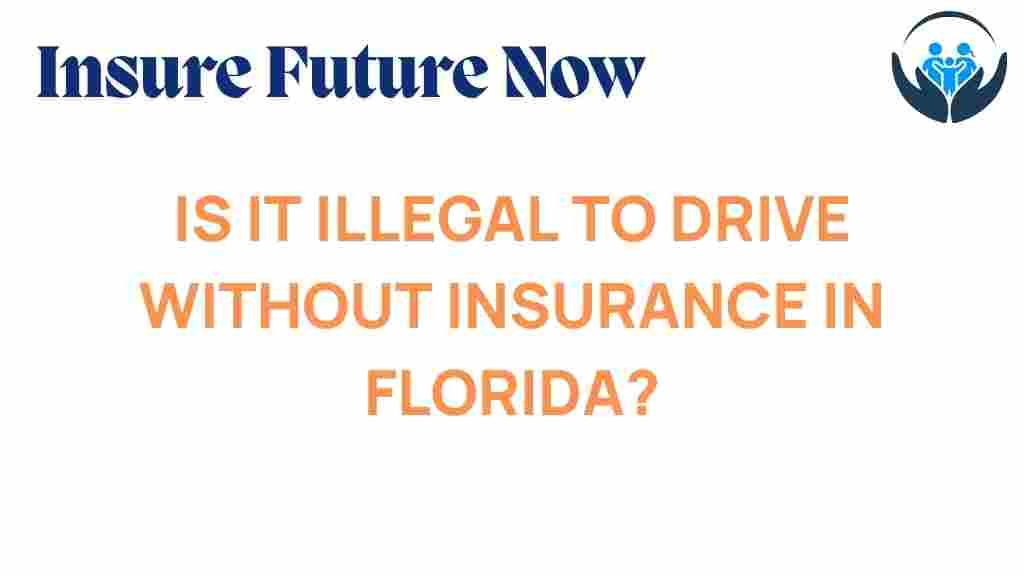Unraveling the Consequences of Driving Without Insurance in Florida
Driving without insurance is a serious issue that affects many drivers in Florida. The state has specific laws regarding auto insurance that are designed to protect all road users, but many individuals still choose to drive uninsured. This article explores the implications of driving without insurance, Florida insurance laws, potential legal penalties, the impact of traffic violations, and what uninsured drivers can expect if they are caught on the road without coverage.
Understanding Florida Insurance Laws
Florida is one of the few states in the U.S. that follows a no-fault insurance system. This means that when an accident occurs, each driver’s insurance covers their own damages regardless of who was at fault. Under Florida law, all drivers are required to carry a minimum amount of insurance, which includes:
- Personal Injury Protection (PIP): At least $10,000
- Property Damage Liability (PDL): At least $10,000
Failing to meet these legal requirements can lead to serious consequences, particularly for those caught driving without insurance.
Legal Penalties for Driving Without Insurance in Florida
The legal penalties for driving without insurance in Florida can be severe. If you are caught driving without valid insurance, you may face the following consequences:
- Fines: The first offense may result in a fine ranging from $150 to $500, depending on the circumstances.
- License Suspension: Your driving privileges may be suspended for up to three years if you fail to provide proof of insurance after a citation.
- Community Service: Repeat offenders may be required to complete community service hours.
- Increased Insurance Rates: If you are caught driving without insurance, it may lead to higher premiums when you do seek coverage.
Additionally, if you are involved in an accident while uninsured, you could be held liable for all damages, which can lead to significant financial burdens.
Traffic Violations Associated with Uninsured Driving
Driving without insurance is categorized as a traffic violation in Florida. Depending on the situation, this can also lead to additional penalties including:
- Points on your driving record: Accumulating too many points can lead to a suspended license.
- Higher fines for related traffic violations: If you’re pulled over for another infraction, being uninsured may result in steeper penalties.
It’s essential to understand how these violations can accumulate and impact your driving record and financial status.
What Happens if You’re an Uninsured Driver? A Step-by-Step Process
If you are caught driving without insurance, here’s what typically happens:
- Traffic Stop: If you are pulled over for a traffic violation and cannot provide proof of insurance, the officer will issue a citation.
- Receiving a Ticket: The ticket will outline the penalties, including fines and possible court appearances.
- License Suspension: If you do not provide proof of insurance to the DMV within 30 days of receiving the citation, your license may be suspended.
- Court Appearance: In some cases, you may need to appear in court to address the violation.
Understanding this process can help you navigate the consequences more effectively.
Troubleshooting Tips for Uninsured Drivers
If you find yourself in a situation where you are driving without insurance, consider the following tips to mitigate potential consequences:
- Obtain Insurance Immediately: If you realize you are uninsured, get coverage as soon as possible to avoid penalties.
- Keep Documentation Handy: Always have proof of insurance in your vehicle to avoid complications during traffic stops.
- Consult Legal Advice: If you receive a citation, consider consulting with a lawyer who specializes in traffic violations.
Staying proactive is key in managing the risks associated with uninsured driving.
The Impact of Uninsured Drivers on Insurance Rates
Uninsured drivers contribute to higher insurance costs for everyone. When accidents occur and the responsible party is uninsured, insurance companies often raise premiums to cover the potential losses. This phenomenon affects all drivers, regardless of their insurance status.
State Regulations and Their Importance
Florida’s regulations are put in place to protect both drivers and pedestrians. Understanding the legal requirements for car insurance is crucial for anyone operating a vehicle in the state. Here are a few important aspects of Florida’s insurance regulations:
- Mandatory Coverage: As mentioned earlier, Florida requires all drivers to have PIP and PDL coverage.
- Proof of Insurance: Drivers must carry proof of insurance at all times while driving.
- Reinstatement Fees: If your license is suspended due to driving without insurance, you may have to pay reinstatement fees.
Understanding these regulations can help you stay compliant and avoid penalties.
Conclusion
Driving without insurance in Florida is not only illegal but carries significant risks and consequences. From legal penalties and traffic violations to financial burdens, uninsured drivers face a range of challenges that can severely impact their lives. It is crucial to understand Florida insurance laws and the associated legal requirements to ensure you are compliant and protected.
If you are currently uninsured, consider taking immediate steps to obtain coverage and understand your responsibilities as a driver. For additional information on Florida’s auto insurance laws, you can visit Florida’s official government website.
Remember, the best way to avoid the severe repercussions of driving without insurance is to stay informed and prioritize your safety and the safety of others on the road.
This article is in the category Policies and created by InsureFutureNow Team
